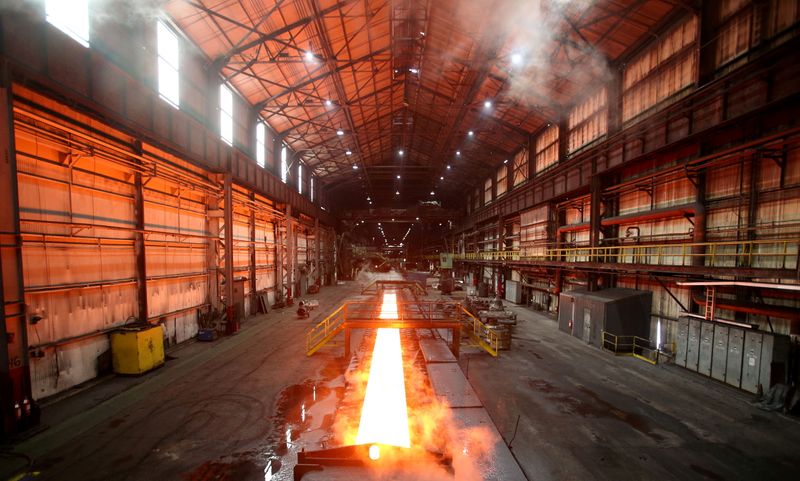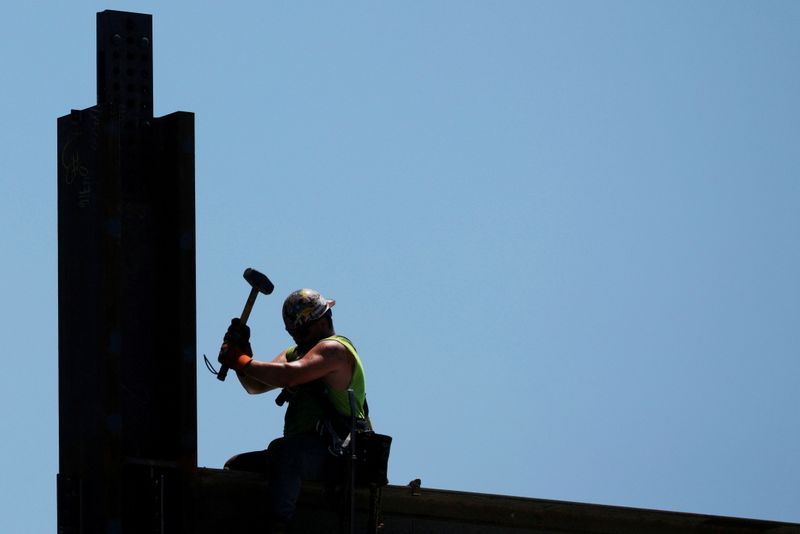By David Lawder and Andrea Shalal
WASHINGTON/ROME (Reuters) -The United States and European Union have agreed to end a festering dispute over U.S. steel and aluminum tariffs imposed by former President Donald Trump in 2018, removing an irritant in transatlantic relations and averting a spike in EU retaliatory tariffs, U.S. officials said on Saturday.
Commerce Secretary Gina Raimondo told reporters that the deal will maintain U.S. "Section 232" tariffs of 25% on steel and 10% aluminum, while allowing "limited volumes" of EU-produced metals into the United States duty free.
It eliminates a source of friction between the allies and lets them focus on negotiating a new global trade agreement to address worldwide excess steel and aluminum capacity mainly centered in China and reduce carbon emissions from the industries.
EU trade chief Valdis Dombrovskis confirmed the deal, writing on Twitter (NYSE:TWTR) https://t.co/FDSrZ3U1Nx that "we have agreed with U.S. to pause" the trade dispute and launch cooperation on a future global arrangement on sustainable steel and aluminum. Dombrovskis said the deal will be formally announced by Biden and European Commission President Ursula von der Leyen on Sunday.
U.S. officials did not specify the volume of duty-free steel to be allowed into the United States under a tariff-rate quota system agreed upon with the EU. Sources familiar with the deal, speaking on condition of anonymity, have said annual volumes above 3.3 million tons would be subject to tariffs.
The deal grants an additional two years of duty-free access above the quota for EU steel products that won Commerce Department exclusions in the past year, U.S. officials said.
The agreement requires EU steel and aluminum to be entirely produced in the bloc - a standard known as "melted and poured" - to qualify for duty-free status. The provision is aimed at preventing metals from China and non-EU countries from being minimally processed in Europe before export to the United States.
Europe exported https://www.reuters.com/article/us-usa-trade-europe-steel-idUSKCN1J322N around 5 million tons of steel annually to the United States prior to Trump's imposition of the tariffs on national security grounds.
"The agreement ultimately to negotiate a carbon-based arrangement on steel and aluminum trade addresses both Chinese overproduction and carbon intensity in the steel and aluminum sector," White House National Security Adviser Jake Sullivan told reporters, adding that the climate and workers can be protected at the same time.
U.S. steel production, which relies heavily on electric-arc furnaces, is regarded as having far lower carbon emissions than the coal-fueled blast furnaces prevalent in China.
Biden has sought to mend fences with European allies following Trump's presidency to more broadly confront China's state-driven economic practices that led to Beijing building massive excess steelmaking capacity that has flooded global markets.
The deal will eliminate Europe's retaliatory tariffs against U.S. products including bourbon whiskey, Harley-Davidson (NYSE:HOG) motorcycles and motor boats that were set to double on Dec. 1, U.S. officials said.
"The end of this long tariff nightmare is in sight for U.S. distillers, who have struggled with the weight of the tariffs and the pandemic," Distilled Spirits Council President Chris Swonger said, also urging Britain to lift its tariff on American whiskeys.
RECORD STEEL PRICES
Raimondo said the deal will reduce costs for steel-consuming U.S. manufacturers. Steel prices have more than tripled in the past year to records topping $1,900 a ton as the industry has struggled to keep up with a demand surge after COVID-19 pandemic-related shutdowns, contributing to inflation.
U.S. primary aluminum producers, which had dwindled to two companies by the time Trump imposed the tariffs, will be able to maintain their investments in reviving domestic capacity because the quotas are set at very low levels, well below pre-tariff volumes, said Mark Duffy, CEO of the American Primary Aluminum Association industry group.
American Iron and Steel Institute President Kevin Dempsey said the quota arrangement will help "prevent another steel import surge that would undermine our industry and destroy good-paying American jobs."

"We urge the U.S. and EU to take active steps to hold China and other countries that employ trade-distorting policies to account," Dempsey added. "We also believe U.S.-EU cooperation should focus on new trade approaches to address climate change, including through development of effective carbon border adjustment measures."
Due to its exit from the EU, Britain's steel exports remain subject to the tariffs, as are those of other U.S. allies including Japan. The U.S. Chamber of Commerce, which opposed the metals tariffs from the start, said the duties and quotas should be dropped from "close allies."
